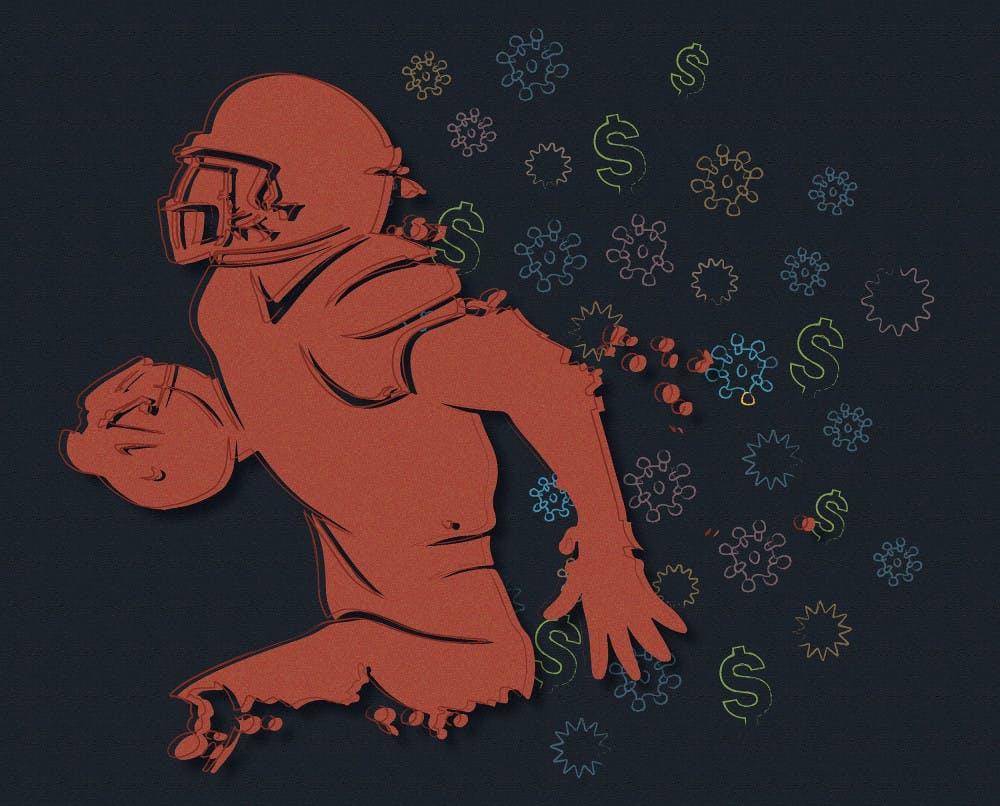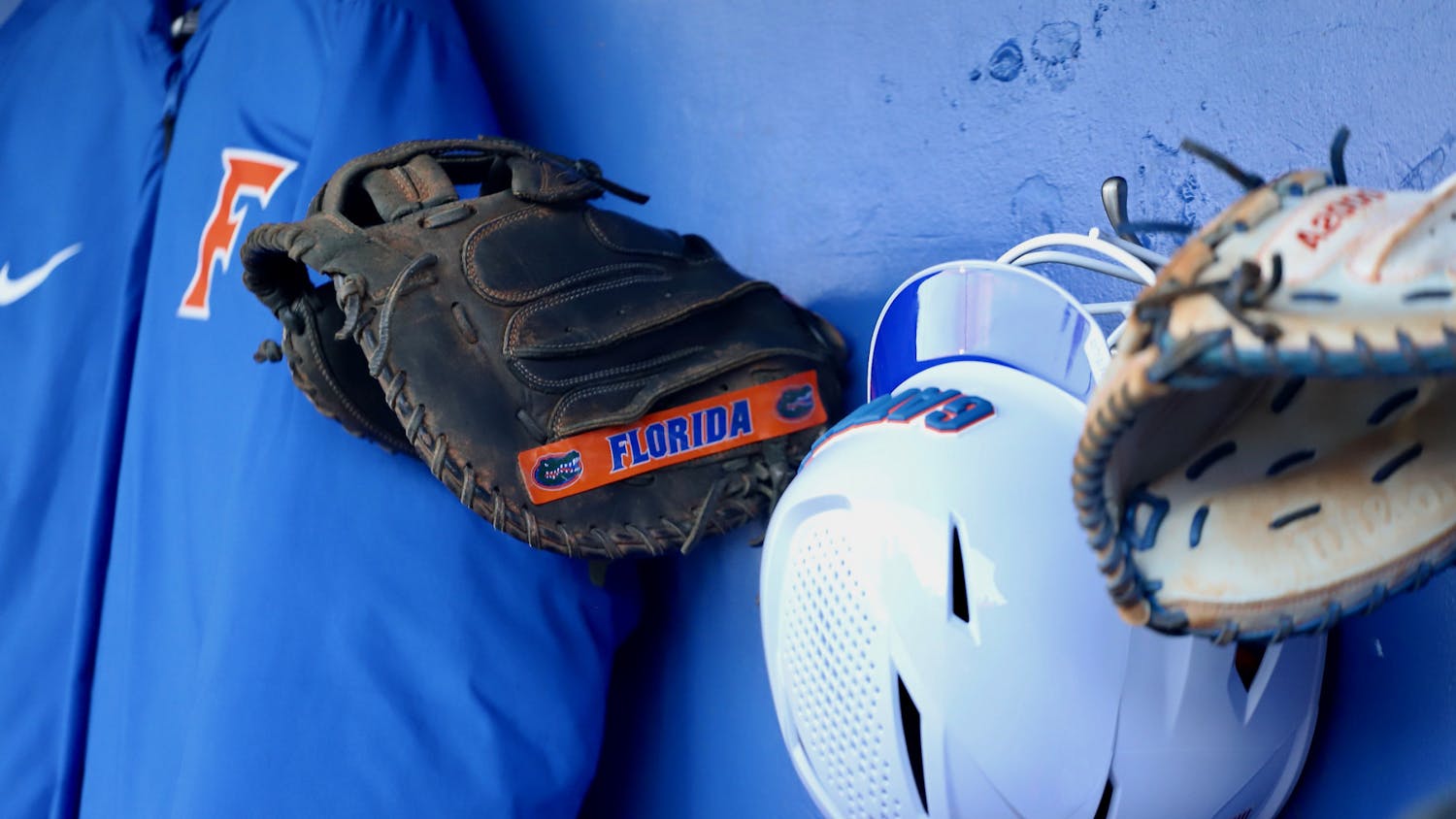During the Fall in Gainesville, everything revolves around Saturdays.
Residents, fans and city officials have waited with bated breath on some sort of decision regarding football — a pillar of the city’s economy — amid a global health crisis.
In an era where the only certainty is uncertainty, one particular dilemma for college towns is how the changes made to the college football season will impact the local economy.
Thursday evening, the SEC announced a 10-game conference-only schedule in light of the COVID-19 pandemic. This means no UF-FSU game for the first time in more than 60 years and likely less than the typical six- or seven-home-game slate the Gators are used to.
In a normal year, Florida’s football program has a direct economic impact of $71 million on the city of Gainesville, according to a 2017-2018 UF IFAS report. Approximately 520,000 people — more than 74,000 people per game — come to the stadium to watch Gators football every Fall. Between in-state and out-of-state visitors, not including UF students or staff, game day crowds generate 422,475 days of lodging. The average guest spends about $168 per day between recreation and entertainment, food and beverage and hotel expenses.
While Florida football has not been outright canceled, individual conference plans are subject to change should the NCAA Board of Governors make a sweeping decision at its Aug. 4 meeting. UF athletic director Scott Stricklin has said he is also unsure about stadium occupancy restrictions and therefore home-game ticket sales as well.
“Once we have an idea of what our attendance capacity could be, we will release our ticketing and seating plan and communicate that to our 2020 season ticket holders,” Stricklin said in a virtual press conference immediately following the SEC’s announcement.
Last year, football ticket sales revenue amounted to just over $26 million, according to the Gainesville Sun. Because of social distancing guidelines, fans may not be permitted to attend games this Fall. If they are allowed, the SEC could advise schools to limit attendance to 20 percent capacity like some NFL teams are planning to do this season. That would potentially result in Florida football generating just over $5 million in revenue from ticket sales this year.
Florida home games have been canceled or moved before due to bad weather. But this season’s schedule shake-up is different than when UF-LSU was moved from the Swamp to Death Valley in 2016 because of Hurricane Matthew.
Smaller — or potentially no — football crowds in tandem with the effects of COVID-19 will have a significant, unprecedented economic impact on the Gainesville economy.
Amanda Phalin, Ph.D., a lecturer in UF’s Warrington College of Business, explained how the pandemic will exacerbate the effects of limited football on the local economy.
“College football programs don’t have long-term positive economic impacts on local economies,” Phalin said.
This is because of the substitution effect, she said
“That means that there are different ways that consumers can spend their money,” Phalin said.
While over $70 million is being spent in and around Ben Hill Griffin Stadium on game days, that money would be spent going out to a restaurant or a movie had there not been a matchup on the gridiron that day.
Conversely, game days tend to depress economic activity around other areas of town due to the congestion brought about by traffic surrounding the game.
“You don’t go shopping at the mall on a game day, and we don’t go out to get stuff done,” Phalin said. “So, the overall effect on economic growth is kind of negligible.”
But in a “COVID world,” as Phalin described it, things are a little bit different.
These alternate outlets for consumer spending that she referred to are few and far between. Businesses are closing or operating with limited hours. Consumer confidence, which makes up approximately 70 percent of the country’s GDP, according to Phalin, is decreasing by the day.
“We just don’t know what’s going to happen with the pandemic or with potential future lockdowns — the rest of the economy,” Phalin said.
In response to economic concerns, Gainesville and Alachua County are working to maintain the business that they’ve managed to keep during the pandemic and bring attention to lesser-known, CDC-guideline-friendly spending outlets for potential consumers.
“Some of our hotels right now are busy with summer traffic from the springs,” Elizabeth Reyes, the sales and marketing manager for Visit Gainesville, said. “They’re staying booked on the weekends because of that.”
Once autumn rolls around, Reyes said that people will still venture into Gainesville whether there is football or not.
Aside from sports, Reyes cited UF Health services, the springs and family visits as the various reasons people still come to Alachua County despite the pandemic.
All of these pulls working together have enabled hotel capacities in Gainesville to hover around 50 percent, according to Reyes. She explained that while this is still a hit to the hotel industry, it’s a more encouraging number than those coming out of surrounding counties.
However, Megan Yaeger, the general manager of the Holiday Inn Express and Suites in Alachua, expressed more concern regarding hotel capacity rates. She estimated that, at the county level, hotels experience about 90 percent capacity on the weekends with home games.
Reports regarding average occupancy over the last four months show cause for concern come August and September. In April, hotel occupancy for Alachua County was at 25 percent, compared to 62 percent at that time last year. In May, hotels averaged 38.2 percent occupancy, down from 61.6 percent last year. Yaeger said that she expects an even more significant dip this Fall because of uncertainty with limited football attendance, among other factors.
According to Staci Bertrand, the vice president of economic development at the Greater Gainesville Chamber of Commerce, approximately 50,000 people drive into Gainesville every day under normal circumstances to go to work. During the pandemic, the number is closer to 30,000 now that some work from home.
About 11,000 people report daily to work at UF Health, and based on COVID-19 test statistics, about 20,000 of UF’s faculty and staff are driving onto campus every day. These 30,000 people consequently spend money in the area on things like food and beverages.
Bertrand also expects people to come into the area for recreational purposes.
“You’re having areas like Butler North and Celebration Pointe where you don’t only just go to eat, but you go to spend the afternoon,” Bertrand said. “It’s all open-air facilities, so you can go in to eat, you can go for a walk, and then you can go outside in their entertainment areas if you’d like to.”
Bertrand stressed the importance of marketing these new areas and existing industry in Gainesville to foster economic engagement while the pandemic still lingers. She cited the EatGNV Facebook page the Chamber of Commerce created to keep people informed about and bring attention to local restaurants that are still operating during this time. Bertrand said the page gained about 1,000 members almost immediately. It had approximately 11,100 members as of Sunday night.
In addition to intricate marketing strategies, Alachua County will aim to assist the community with local implementation of the CARES Act. According to Mark Sexton, the communications and legislative affairs director for Alachua County, federal money is being pushed to the states, which in turn, are distributing that money to counties, which have the option of adopting their own local version of the CARES Act. Alachua County opted in and will be receiving $46.9 million to distribute.
“The County Commission made it very clear that its priority will be giving money to individuals and small and medium businesses,” Sexton said. “There’s also some money that’s going to go to government entities to assist with some of the extraordinary expenses that they have faced for the last four months.”
Sexton said that the county commission will meet Monday to iron out the program’s logistical details. As soon as Tuesday, the commission will open the application process and launch a website with more information.
Overall, the message from economic experts and county and city officials is the same: this pandemic is a socially and economically unprecedented event.
One thing is certain, however: Flattening the virus’s curve is essential for a return to normal life — that goes for the 8,000 unemployed people in Alachua County, according to Bertrand, and for UF athletics.
“We want the community to be as safe as possible,” Bertrand said. “We’re going to have an economic impact, it will be greater if the coronavirus doesn’t go away. The sooner we can all be safe and stop the spread, the sooner our economy will rebound.”
Follow Payton on Twitter @petitus25 and contact her at ptitus@alligator.org.

Payton is a sophomore journalism major from Jacksonville, Florida. She is The Alligator's Spring 2021 digital managing editor. Her previous roles include softball beat writer, football beat writer and online sports editor.






